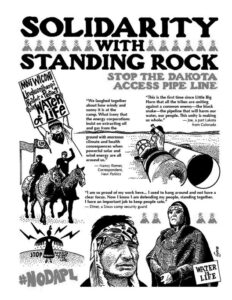
Brian Ward narrates his experience of participating in the Standing Rock encampment in 2016 and analyzes the legacy of the struggle.

Brian Ward narrates his experience of participating in the Standing Rock encampment in 2016 and analyzes the legacy of the struggle.
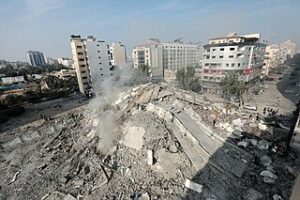
Start with the rockets fired into Israel by Hamas on October 7, 2023 and not with the illegal occupation of Palestinian land by Israel and the blockade of Gaza since 2007, and you have an entirely different story.
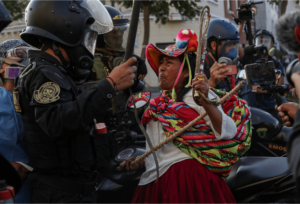
An interview with Mirtha Vásquez, former PM under Pedro Castillo, on the explosion of unrest against the imposition of Dina Boluarte and the legacy of Fujimori.

While I admire the political values of these two scholars, I don’t find either of these books satisfying because they like many other authors perpetuate the romantic view of Ricardo Flores Magón.

Starting in April 2021, a bold movement set out to defend Weelaunee Forest in Atlanta, Georgia, where local politicians and corporate profiteers want to build a police training compound known as Cop City. In the following assessment, participants evaluate the strategic hypotheses that the movement has produced and tested over the past two years and reflect on the risks and possibilities of the next phase of the struggle.

Interview with Abundia Alvarado, a co-founder of Mariposas Rebeldes and a member of the movement to protect Weelaunee Forest from the construction of Cop City.
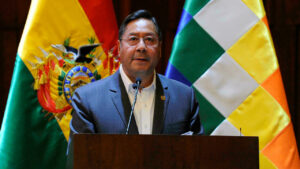
In October and November of 2019, clashes over the validity of presidential elections in Bolivia led to protests and the eventual ouster of the leftist Indigenous president Evo Morales, in what most observers characterized as a coup. In the year . . .

Anti-capitalist ecologist Spencer Roberts advocates a decolonial, just transition away from animal agriculture and wildlife extraction.
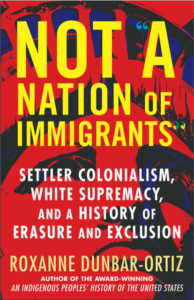
Review of Roxanne Dunbar-Ortiz, Not “A Nation of Immigrants”: Settler Colonialism, White Supremacy, and a History of Erasure and Exclusion.
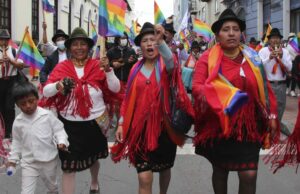
Scholars and activists respond to the spirited attacks by Jacobin and Monthly Review on Yaku Pérez, the indigenous candidate in Ecuador’s presidential election.
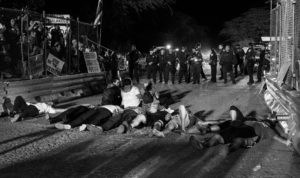
New Politics editor’s note: This interview, originally published in Earth First! Journal‘s winter 2019-20 issue and posted here with permission, outlines Hawaii’s Ku Kia’i Kahuku environmental justice struggle against a large wind energy installation, the island’s tallest structure, in a . . .
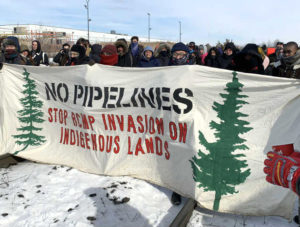
In early February, the RCMP, Canada’s colonial police force, raided the land defender camps of the Wet’suwet’en people in British Columbia, in order to clear the way for pipeline construction. Clearly, none of the political decision makers responsible for this . . .
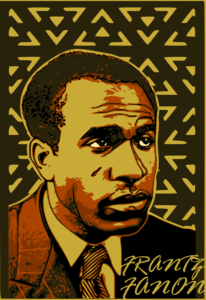
Anti-colonialism is understood to be both a group of historical events and a critical analysis of past and ongoing imperialisms.
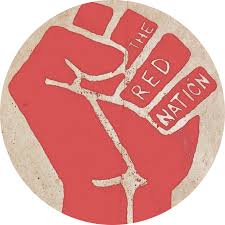
The politics of solidarity on display during the fight against the Dakota Access Pipeline have raised the issue of Indigenous liberation more and more sharply to people on the left.
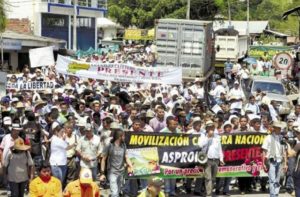
Latin America is experiencing an abrupt change generated by enormous confrontations between the dispossessed and the privileged. This confrontation includes both revolts by the people and reactions by the oppressors.
The October Revolts
The uprising in Chile is the most important event . . .
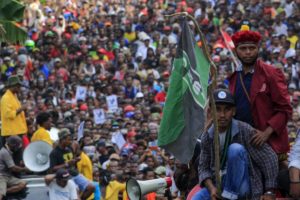
Resistance to the Indonesian government continues in West Papua, and it has a history.
Shortly after declaring independence in 1961, following the departure of the Dutch (who controlled the region), West Papua was invaded by Indonesian forces—Indonesia felt as though the . . .

After nearly 14 years in power, the government of Evo Morales fell in a little less than a month, due to allegations of fraud and the desire to remain in power. Previously, Morales was a campesino leader, but this time . . .

The coup d’état against Bolivian president Evo Morales has generated the kind of anguish that great defeats of revolutionary struggles evoke: Allende’s fall, Che’s death in combat, defeat in the Spanish Civil War. “Criticism is no passion of the head, . . .